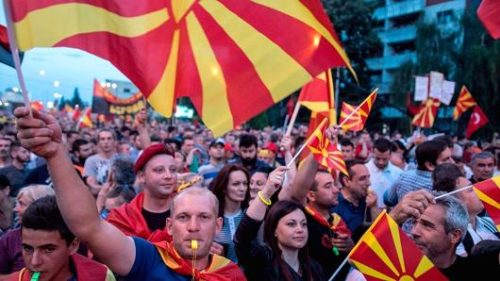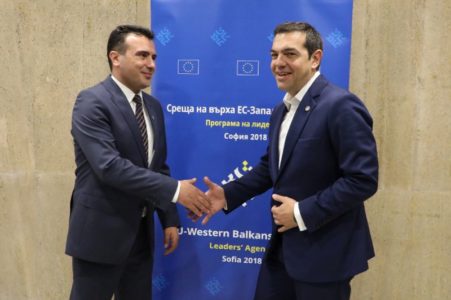That’s not My Name
The FYROM Name Dispute

(Source: CNBC)
This week taught us that some things do not last eternally, despite how sometimes it seems to be like that. The first example is the football World Cup, which started yesterday in Russia, but for the first time in decades without the major player Italy. The absence is more than visible, as well as the depression among my Italian friends. The second example is the name dispute between Greece and the Former Yugoslav Republic of Macedonia (FYROM), which is going on throughout most of my life.
This week the Greek Prime Minister Alexis Tsipras and the Macedonian Prime Minister Zoran Zaev have finalised the talks on the name issue, after Greece has been blocking FYROM from the EU and NATO accession talks for so many years, only allowing it to enter the UN under this provisional name of FYROM that no one seems to like. Not to mention that it contains the name of the long-time dead federation that ended up in bloody wars.
Therefore the two leaders managed to discuss the tough issue over the past months, letting the silent diplomacy to prepare the ground for their achievement. After many names have been leaked to the media in order to test the public opinion, in the end they decided to go with the name of the Republic of North Macedonia, while the ethnic group will remain to be Macedonian/Citizens of Northern Macedonia. Nevertheless, this issue is not over and it is still far away of being implemented. Despite the EU and NATO being overwhelmingly happy about these talks, calling them a historical achievement, oppositional voices occurred immediately after the announcement.

Prime Ministers Zoran Zaev and Alexis Tsipras (Yahoo)
The first ones to protest were, needless to say, the oppositional forces in both countries. In Greece, the oppositional conservative New Democracy will try to use the opportunity to destabilize the leftist Prime Minister Tsipras. Regarding the FYROM, it is currently ruled by a coalition of social democrats and the ethnic Albanian parties. Both of them are pro-EU and pro-NATO, and gained power last year after managing to oust the nationalistic and Russia-flirting VMRO-DPMNE, which is aligned with EPP on the European level. They expressed their outrage for the agreement and will try to sabotage it as much as possible. They will probably use the grassroots methods, public protests and the usual political tools.
A member of VMRO-DPMNE is also the President of FYROM Gjorge Ivanov, who already announced that he will block the name change. However, last year he also said that he will not give the mandate to form a government to social democrat Zoran Zaev, but had to refrain after strong international pressure. The international factor is a vital factor for this story. Obviously, the EU and NATO are very interested, as the FYROM became an EU candidate country a decade ago, but could not open up negotiations due to the Greek veto. Regarding NATO, FYROM would have become a member with Albania and Croatia in 2009, but was blocked by Greece. Hence, NATO is just waiting for the deal to be finalised. And this is what bothers Russia, which is carefully monitoring the situation. After losing influence in Montenegro, Russia would definitely not welcome the FYROM becoming a NATO member, as basically its influence in Southeast Europe would then be additionally reduced. That is why Russia is favouring this status quo, and will probably do what it takes to encourage the oppositional forces to block the deal.
Now, we await to see how things will develop. A referendum on the name issue will be held in FYROM in autumn, with some speculating that Zaev will call the snap elections as well. Regarding Greece, their parliament is expected to vote on the issue before this month’s European Council summit. It is visible that optimism has returned to FYROM, and the Macedonian citizens definitely deserve a Euro Atlantic perspective after so many years of status quo. However, some challenges that I have mentioned earlier are not benign and need to be addressed carefully, so that the deal does not fall apart. I am pretty sure that Federica Mogherini, Johannes Hahn and Jens Stoltenberg are pretty much aware of that.
